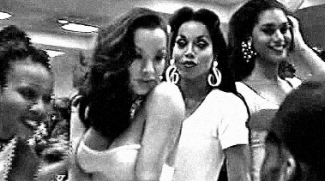Fall 2017 | Oral History and the Arts
Oral history is an art. The practice of oral history is creative -- in interviews we make narratives together with our interviewees, imagining worlds, telling stories, creating characters. Oral history can also be used to document the arts, to tell the stories of painters and dancers and actors and writers and the worlds they live in. And the arts are a powerful means to amplify and interpret oral histories, transforming them into literary narratives, building theater or music or dance performances from them, using them to create documentaries. This year, we will explore all of these many intersections of oral history and the arts, asking what unique contributions an oral history approach can make to artistic practice, and how oral history can help us to think about art and its role in the world.
Thursday Evening Event Series
〰️
Thursday Evening Event Series 〰️
Find more about speakers, individual events, and student reflections through the Learn More buttons.
Spring 2018
Santa Fe Art Institute, March 2017, Photographer: Robert Gomez Hernandez
September 14, 2017, 6:00 - 7:30 PM
Oral History As Engaged Community Listening, Ceremonial Practice and Performative Art
IN-PERSON with Mi'Jan Celie Tho-Biaz
Generally oral historians conduct their interviews in private, but private interviews, by their very nature, limit who can witness and contribute to question generation during the real-time interview process. Small, public oral history interviews that are thoughtfully designed and carefully curated as performative art spaces, can facilitate a larger witnessing.
Playa de los Lances, Tarifa, Spain 2009, Photographer: Eva Leitolf
September 21, 2017, 6:00 - 7:30 PM
Interviewing artists: intersubjectivity and visuality
IN-PERSON with Luisa Passerini
This talk will be based on a work in progress for the European Research Council research project “Bodies Across Borders: Oral and visual memory in Europe and beyond”, and more specifically on Luisa Passerini's interviews with various visual artists, including video-artist Ursula Biemann and photographer Eva Leitolf. Both artists have worked on migration, documenting the problems of external and internal borders of Europe.
October 19, 2017, 6:00 - 7:30 PM
From Field to Performance: Adapting Oral History and Ethnographic Field Research for the Stage
IN-PERSON with E. Patrick Johnson
Drawing on his research on black queers of the South, Johnson will discuss how he adapted oral history narratives and field research to the stage and then to film. The lecture will also engage questions of ethics, advocacy and aesthetics.
October 26, 2017, 6:00 - 7:30 PM
A History of Echoes-Part 1: Memory and Militant Sound Investigations
IN-PERSON with Robert Sember
This first session will focus on the history of the collective, specifically its roots in the HIV/AIDS social movements of the 1990s, and its investigation of listening practices within community organizing initiatives. For this session, Ultra-red will draw on materials from long-term investigations in Los Angeles, New York, and London that are part of the “School of Echoes” phase of its work.
November 2, 2017, 6:00 - 7:30 PM
A History of Echoes-Part 2: Sound of Trans Freedom
IN-PERSON with Michael Roberson
The second session will describe Vogue’ology, a collaboration between the Arbert Santana Ballroom Freedom and Free School, which includes the Ballroom Archive and Oral History Project, and Ultra-red. Vogue’ology is an initiative by and for members of New York’s House and Ballroom Scene, a creative collective and intentional kinship system established by LGBTQ individuals of color. The decision to archive the community’s histories builds on its tradition of intergenerational learning.
December 7, 2017, 6:00 - 7:30 PM
"Beyond words": oral tradition and the music of Julia Wolfe
IN-PERSON with Julia Wolfe
Join us as Julia Wolfe discusses her multiple roles as composer, researcher and interviewer, and how her compositions, rooted in the past and focusing on workers, labor, and industrialization, have gained new relevance and audiences, in coal country, throughout the U.S. and beyond.
Find more Events with OHMA
〰️
Find more Events with OHMA 〰️







